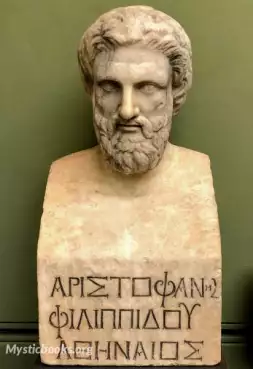
Peace
by Aristophanes
'Peace' Summary
In Aristophanes's *Peace*, the play opens with Trygaeus, a frustrated Athenian farmer, yearning for an end to the Peloponnesian War. Desperate for peace, he decides to travel to Mount Olympus to confront Zeus, the King of the Gods, and demand an end to the conflict. To reach the heavens, Trygaeus utilizes a giant dung-beetle as a mount, embarking on a whimsical and absurd journey. Upon arrival, Trygaeus discovers that the Gods have abandoned Olympus, leaving only the God of War, who is busy pounding up Greek states in a giant mortar. Driven by his desire for peace, Trygaeus learns that the Goddess of Peace has been imprisoned in a pit, and rallies the Greek people to unite and rescue her. With their combined efforts, they successfully free Peace and restore her to her rightful place, bringing an end to the war and ushering in a new era of peace and prosperity. The play culminates in a joyous celebration of peace, where Trygaeus even finds love with Opora, the handmaiden of Peace. Throughout the play, Aristophanes satirizes the Athenian political scene, particularly through his portrayal of Cleon, a powerful demagogue, and his criticisms of the war's devastating impact on Athenian society. *Peace* serves as a powerful plea for peace and a testament to the resilience and hope that can flourish even amidst times of conflict.Book Details
Authors

Aristophanes
Greece
Aristophanes son of Philippus, of the deme Kydathenaion was a comic playwright or comedy-writer of ancient Athens and a poet of Old Attic Comedy. Eleven of his forty plays survive virtually complete....
Books by AristophanesDownload eBooks
Listen/Download Audiobook
- Select Speed
Related books

Circus by Edwin Carty Ranck
This collection of poems, known as 'The Circus', is a lighthearted and often satirical exploration of everyday life, human nature, and the absurdities...

Market Women's Cries by Jonathan Swift
Jonathan Swift's 'Market Women's Cries' is a collection of satirical poems that capture the bustling atmosphere of the 18th-century English market. Sw...

Mrs. Raffles by John Kendrick Bangs
Mrs. Raffles is a series of humorous short stories that follows the exploits of Mrs. Raffles, the widow of the legendary gentleman thief, A.J. Raffles...

Eagle's Shadow by James Branch Cabell
In "Eagle's Shadow", James Branch Cabell crafts a humorous and satirical exploration of love, wealth, and the complexities of social standing. The nar...

Schoolmaster and Other Stories by Anton Chekhov
Anton Chekhov, renowned for his plays like "Uncle Vanya" and "The Cherry Orchard," was a master of the short story. "The Schoolmaster and Other Storie...

Ostseemärchen by Hans Hoffmann
This book, 'Ostseemärchen' by Hans Hoffmann, is a collection of stories and tales inspired by the Baltic Sea region. It features a blend of folklore,...

Trolley Folly by Henry Wallace Phillips
This collection of eleven short stories showcases Henry Wallace Phillips' unique brand of humor. The stories are lighthearted and filled with amusing...

Ion by Thomas Noon Talfourd
Ion is a tragic drama set in ancient Greece, written by the Victorian lawyer and playwright Thomas Noon Talfourd. The play explores themes of honor, d...

Ecclesiazusae by Aristophanes
In the ancient city of Athens, the women have decided to take over the government from the men in order to solve the problems of the state and its cit...

rey de las montañas by Edmond About
This novel follows a young botanist sent to Greece by the Paris Museum to search for a rare plant, the "Boryana variabilis." His journey is filled wit...
Reviews for Peace
No reviews posted or approved, yet...